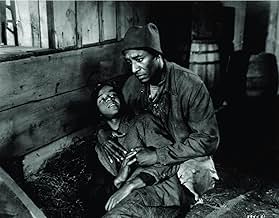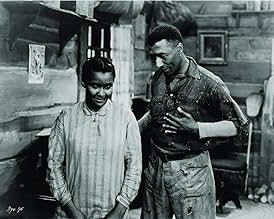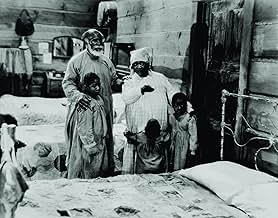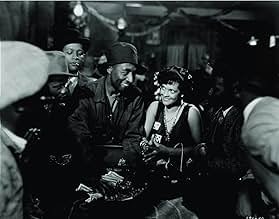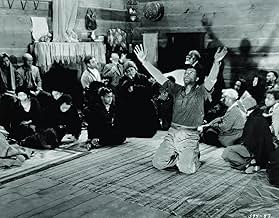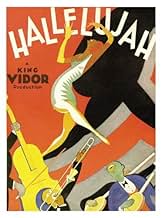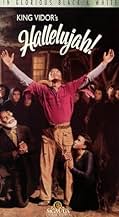IMDb RATING
6.7/10
2.2K
YOUR RATING
A sharecropper decides to become a preacher after falling for a vamp from the city.A sharecropper decides to become a preacher after falling for a vamp from the city.A sharecropper decides to become a preacher after falling for a vamp from the city.
- Nominated for 1 Oscar
- 3 wins & 1 nomination total
Matthew 'Stymie' Beard
- Child
- (uncredited)
Evelyn Pope Burwell
- Singer
- (uncredited)
Eddie Conners
- Singer
- (uncredited)
William Allen Garrison
- Heavy
- (uncredited)
Eva Jessye
- Singer
- (uncredited)
Sam McDaniel
- Adam
- (uncredited)
Clarence Muse
- Church Member
- (uncredited)
Featured reviews
I want to thank TCM for showing this movie and all others that wouldn't see the light of day. Yes this movie is crude in all phases of a movie coming together today. Since it took place in 1928 it's wonderful. My mother grew up down south in N.C. so yes a lot of Blacks were poor,picking cotton,living in shacks and finding release in either the church and or what was called the "devil's business" ,vice. The first time I saw this movie I wanted to cry, everything was so sad,and ugly but it held my interest. I hated how Zeke abandoned his family and I wanted them to hate him too.The "hootchie mama" Chick was very pretty and had a natural performing talent. I felt sorry for her when she died since she only wanted to be free. Funny thing about the movie is all over the U.S. the same story about Church,Sin, the Man of God, and the Heathen Woman is still going on.I love old movies with shaky film,missing dialouge,unskilled actors and all. It's a walking, talking bit of history unfolding before your eyes. I think as I watch the movie, did any of the actors make something of themselves? was anyone shunned for even doing this? did any church come out for the movie since I know many churches probably were against it. I saw the remark about it being racist and I disagree. It's a fact that Blacks sang as a release from the real world and all the misery that awaited them day after day. What would have been racist is if the actors had been White but in blackface. TCM showed this yesterday 10/5/04 and it's the 4th time I've seen it.I rate this 8/10.
It's important to realize this was only the first year of sound pictures. Seen in that light, HALLELUJAH! has a remarkable fluidity, and a freedom from the tyranny of the sound camera that is little short of astonishing. (See "Singin' in the Rain" for a realistic depiction of this problem.) The acting is on a high level, if somewhat dated. King Vidor did an admirable job in depicting his characters' life condition, and was deservedly nominated as Best Director of 1929/30.
I probably don't need to go into the historical facts about this movie or the plot, as this had probably been expunded in numerous other comments. Personally I think that Hallelujah is a beautiful and powerful film, sympathetic to African Americans, and I think it's remarkable that it was produced at all.
Hallelujah is a huge production, with hundreds of extras. The cast was made up of mostly unknowns. Cast members like Fally Belle McKnight and Victoria Spivey apparently never made any other films, and leads Daniel L. Haynes and Nina Mae McKinney were obviously getting started. The cast is very good, I thought, especially Spivey (a veteran of the stage) as Rose. Haynes is okay in the beginning, seeming a little uneven in his role as well-meaning rogue Zeke, but the final scenes allow him to prove the commanding presence he could muster as an screen presence. Nina Mae McKinney is a power-house. A short, curvy beauty with an interesting voice, she has something of a young Myrna Loy. In fact, I just recently saw a still from a Loy film called The Squall where Loy looks an awful lot like McKinney.
Movies like Hallelujah are an acquired taste. When I first saw it, I was distracted by the crudeness of the sound, the jagged editing and the overall unevenness of the movie. Sure, two or three years later, Hollywood was turning out glossy productions like Red Dust and Blond Venus, with highly polished editing, clear sound and more mobile camera-work, but this is 1929. Sound film-making techniques had yet to be smoothed out. The crinkles of a young process actually add charm to this film, if you know to expect them.
I'll admit as well that, when I first saw Hallelujah, I was irritated by the voices. There's a lot of screeching from the women, and a great deal of mumbling as well. A second viewing, though, allows one to see past these "irritating" aspects and appreciate the voices for what they are. This way, Fanny Belle McKnight's agonized cries of sorrow and her singing the children to sleep is more touching than it is grating.
It's hard to know what else to say about the film. For all it's shortcomings, it's a touching film, lyrical even. I think it's a wonderful production, and I doubt it would not have been made much differently by a black director. Plus, one must agree, King Vidor was a far better craftsman than Oscar Micheaux. 9/10
Hallelujah is a huge production, with hundreds of extras. The cast was made up of mostly unknowns. Cast members like Fally Belle McKnight and Victoria Spivey apparently never made any other films, and leads Daniel L. Haynes and Nina Mae McKinney were obviously getting started. The cast is very good, I thought, especially Spivey (a veteran of the stage) as Rose. Haynes is okay in the beginning, seeming a little uneven in his role as well-meaning rogue Zeke, but the final scenes allow him to prove the commanding presence he could muster as an screen presence. Nina Mae McKinney is a power-house. A short, curvy beauty with an interesting voice, she has something of a young Myrna Loy. In fact, I just recently saw a still from a Loy film called The Squall where Loy looks an awful lot like McKinney.
Movies like Hallelujah are an acquired taste. When I first saw it, I was distracted by the crudeness of the sound, the jagged editing and the overall unevenness of the movie. Sure, two or three years later, Hollywood was turning out glossy productions like Red Dust and Blond Venus, with highly polished editing, clear sound and more mobile camera-work, but this is 1929. Sound film-making techniques had yet to be smoothed out. The crinkles of a young process actually add charm to this film, if you know to expect them.
I'll admit as well that, when I first saw Hallelujah, I was irritated by the voices. There's a lot of screeching from the women, and a great deal of mumbling as well. A second viewing, though, allows one to see past these "irritating" aspects and appreciate the voices for what they are. This way, Fanny Belle McKnight's agonized cries of sorrow and her singing the children to sleep is more touching than it is grating.
It's hard to know what else to say about the film. For all it's shortcomings, it's a touching film, lyrical even. I think it's a wonderful production, and I doubt it would not have been made much differently by a black director. Plus, one must agree, King Vidor was a far better craftsman than Oscar Micheaux. 9/10
There's something hypnotic about good preaching. All that passion, all that energy, whether it's in film or in person, has a cumulative power. It's hard to doubt the spreading power of religion when you see Daniel L. Haynes (this film) or Robert Duvall ("The Apostle"), or read the sermon at the end of "The Sound and the Fury." Feverishly, they try and communicate God's word. They rant, they rave, they speak quickly and with an undeniable amount of integrity. They get the crowd going, usually in whoops and outbursts, and one man's conversation with God becomes a community event. (Indeed, the power of a worked-up crowd is a powerful tool in and of itself).
That's what's so terrific about King Vidor's "Hallelujah." Everyone's up in arms about one thing or another in this movie, whether it's money, sex, or Jesus. Early in the film there's a rather ludicrous scene where the hero's brother is accidentally killed, due to the hero's folly and hubris. That's his Sin, for which he must Redeem Himself Before God. There's also a woman who represents Temptation, who leads him astray time and time again. In the end there's an extended chase through a swamp, that would be done again in Kurosawa's "Stray Dogs."
All of that's well and good, but the film really peaks during the sermon sequences. Done wrong, sermons in movies usually pass by unnoticed, or are used as a clothsline to hang lame jokes about apathetic churchgoers. Done right, as in this film, "The Apostle," and the most unusual ones in "Beloved," they can be as captivating as if you were really in attendance. It's a testament to the power of the motion picture.
That's what's so terrific about King Vidor's "Hallelujah." Everyone's up in arms about one thing or another in this movie, whether it's money, sex, or Jesus. Early in the film there's a rather ludicrous scene where the hero's brother is accidentally killed, due to the hero's folly and hubris. That's his Sin, for which he must Redeem Himself Before God. There's also a woman who represents Temptation, who leads him astray time and time again. In the end there's an extended chase through a swamp, that would be done again in Kurosawa's "Stray Dogs."
All of that's well and good, but the film really peaks during the sermon sequences. Done wrong, sermons in movies usually pass by unnoticed, or are used as a clothsline to hang lame jokes about apathetic churchgoers. Done right, as in this film, "The Apostle," and the most unusual ones in "Beloved," they can be as captivating as if you were really in attendance. It's a testament to the power of the motion picture.
Nina Mae McKinney portrayed Chick in this movie. The untrained, natural singing, dancing, acting talent stole everyone's heart who saw this movie, even till this day she's still winning hearts. A great actress, after this movie people named her "The Black Garbo" and "The Dark Clara Bow". Being the first black actress, she had to represent her race well, and show that Blacks could act, and show Hollywood that Blacks could hold their own on the silver screen. Norma Shearer, John Gilbert, Irving Thalberg, and King Vidor was breath-taken by her acting, and after her you saw many white actresses copying her style, the hands on the hips and facial expressions. This movie isn't stereotypical at all, its about Black Life in the South, the music and styles of the time. Nina Mae was promised many more movies, but never did anything else, but singing apperances, shorts, and maid apperances. But she did get to show her acting in the independent black movies. If you ever get to see them, you won't be sorry. People say this movie was ahead of its time, maybe so, But Nina was lucky she got to show all her talents, singing, dancing, comedy, and acting. Even Blacks don't get to show all of that today. People say that Lena Horne opened the doors, thats false, Nina Mae McKinney did, representing the Black race well, and showing that we could act, open the doors for Blacks in the future in Hollywood.
Did you know
- TriviaAlthough this film is frequently touted as the first black-cast film produced in Hollywood, it is actually predated by the more obscure Hearts in Dixie (1929).
- GoofsWhen Zeke confronts Chick and Hot Shot and strong-arms them in front of the crowd, the shadow of the microphone falls across Hot Shot as he is pushed to the background of the scene and tries to regain his composure. The shadow of the boom is also visible falling across the extras behind him.
- Alternate versionsMGM also issued this movie in a silent version, with Marian Ainslee writing the titles.
- SoundtracksSometimes I Feel Like a Motherless Child
(uncredited)
Traditional Spiritual
Sung offscreen during the opening credits
- How long is Hallelujah?Powered by Alexa
Details
- Runtime
- 1h 49m(109 min)
- Color
- Aspect ratio
- 1.20 : 1
Contribute to this page
Suggest an edit or add missing content


